|
|
|
Sort Order |
|
|
|
Items / Page
|
|
|
|
|
|
|
| Srl | Item |
| 1 |
ID:
080824
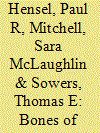

|
|
|
|
|
| Publication |
2008.
|
| Summary/Abstract |
Contentious issues are important sources of militarized conflict. This article advances an issue-based approach to world politics, focusing on disagreements over territory, maritime zones, and cross-border rivers. We characterize militarized conflict and peaceful techniques as substitutable foreign policy tools that states can adopt to resolve disagreements over issues, and we present hypotheses to account for issue management based on issue salience and recent interaction over the same issue. Empirical analyses reveal that states are more likely to use both militarized conflict and peaceful methods when the issue at stake is more salient, both when the general issue type is considered more salient and when the specific issue under contention has greater within-issue salience. Recent issue management also plays an important role, as histories of both militarized conflict and failed peaceful settlements increase pressure to take further action to settle the issue
|
|
|
|
|
|
|
|
|
|
|
|
|
|
|
|
| 2 |
ID:
080825
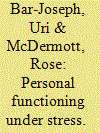

|
|
|
|
|
| Publication |
2008.
|
| Summary/Abstract |
Much work has explored decision making under stress in political leadership. Less work has attempted to link the enormous emotional pressure of crisis with both the heightened sense of political accountability and responsibility and the increased need for social support under such circumstances. The authors examine the impact of political accountability, and the nature and quality of individual social support, on the relative performance of five central Israeli leaders on the second day of the Yom Kippur War. Minister of Defense Moshe Dayan and the Commander of the Southern Command, Maj. Gen. Shmuel Gonen, performed very poorly, whereas Prime Minister Golda Meir and Chief of Staff Lt. Gen. David Elazar performed very well. The Commander of the Northern Command, Maj. Gen. Yitzhak Hofi, performed adequately. The authors account for these divergences in performance based on individual differences in personal accountability and available social support networks.
|
|
|
|
|
|
|
|
|
|
|
|
|
|
|
|
| 3 |
ID:
080823
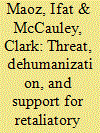

|
|
|
|
|
| Publication |
2008.
|
| Summary/Abstract |
Public opinion can permit or encourage retaliatory aggressive state policies against vulnerable but threatening out-groups. The authors present a model in which public support for such policies is determined by perceived threat from and dehumanization of the target group. This two-factor model predicts Israeli Jews' support for two retaliatory aggressive policies: the more hypothetical notion of Palestinian population transfer and concrete, coercive actions toward Palestinians. The authors find (1) that threat and dehumanization are distinct constructs, each having unique contributions to explaining support for aggressive retaliatory policies, (2) that threat and dehumanization significantly explain support for aggressive retaliatory policies when respondents' hawkishness, socioeconomic status (SES), and education level are taken into account, and (3) that the association of hawkishness and SES with support for aggressive retaliatory policies is largely mediated by threat perception. Results are highly consistent across two studies, suggesting the two-factor model may be useful for understanding support for aggressive action in situations of asymmetric conflict
|
|
|
|
|
|
|
|
|
|
|
|
|
|
|
|
| 4 |
ID:
080821
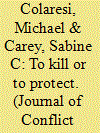

|
|
|
|
|
| Publication |
2008.
|
| Summary/Abstract |
Contemporary studies of genocide have found military capabilities to be inconsistent predictors of state-sponsored killings. We suggest that these empirical inconsistencies stem from the fact that government strength can serve two opposing purposes. Some level of armed capabilities is necessary for a state to remain viable and to provide internal and external security. Yet armed government personnel can be deployed to repress and destroy segments of the public. We identify conditions under which an executive is more likely to use security forces for private-interest killing rather than public protection. We hypothesize that unconstrained leaders are more likely to use their putative security forces to initiate genocide and remain in power. An analysis of state failures that lead to genocide robustly supports the idea that the effect of increased security forces on the risk of genocide is conditional on institutional executive constraints
|
|
|
|
|
|
|
|
|
|
|
|
|
|
|
|
| 5 |
ID:
080822
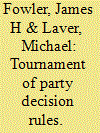

|
|
|
|
|
| Publication |
2008.
|
| Summary/Abstract |
Following Axelrod's tournaments for strategies in the repeat-play prisoner's dilemma, we ran a ``tournament of party decision rules'' in a dynamic agent-based model of party competition. We asked researchers to submit rules for selecting party positions in a two-dimensional policy space, pitting each rule against all others in a suite of long-running simulations. The most successful rule combined a number of striking features: satisficing rather than maximizing in the short run, being ``parasitic'' on choices made by successful rules, and being hardwired not to attack other agents using the same rule. In a second suite of simulations in a more evolutionary setting in which the selection probability of a rule was a function of the previous success of agents using the same rule, the rule winning the original tournament pulled even further ahead of the competition
|
|
|
|
|
|
|
|
|
|
|
|
|
|
|
|
| 6 |
ID:
080820
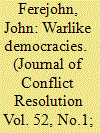

|
|
|
|
|
| Publication |
2008.
|
| Summary/Abstract |
Classical republican theories are monadic in the sense of seeing in each political regime a set of typical operating characteristics. There is disagreement as to what those characteristics are and specifically whether republican governments are more likely to be aggressive or peace loving. We group these two views as (democratic) mobilization theory versus (republican) checks theory and argue, first, that each can help us understand the finer structure of republican government; second, that they are not contradictory but can be combined in various ways in the same institutions; and third, that they offer the prospect of deepening our understanding of what is called the democratic peace proposition.
|
|
|
|
|
|
|
|
|
|
|
|
|
|
|
|
|
|
|
|
|